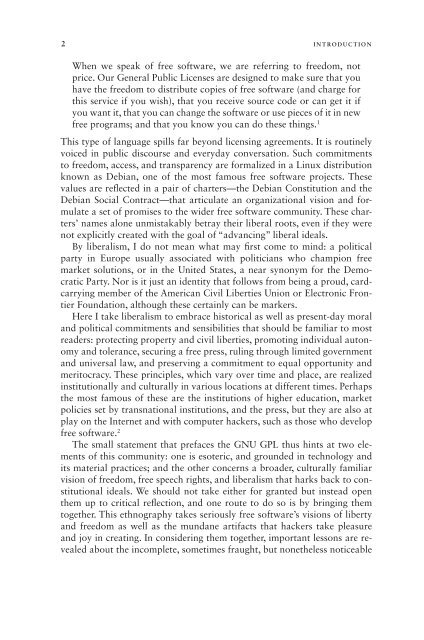V2TXZi
V2TXZi
V2TXZi
Create successful ePaper yourself
Turn your PDF publications into a flip-book with our unique Google optimized e-Paper software.
2 INTRODUCTION<br />
When we speak of free software, we are referring to freedom, not<br />
price. Our General Public Licenses are designed to make sure that you<br />
have the freedom to distribute copies of free software (and charge for<br />
this service if you wish), that you receive source code or can get it if<br />
you want it, that you can change the software or use pieces of it in new<br />
free programs; and that you know you can do these things. 1<br />
This type of language spills far beyond licensing agreements. It is routinely<br />
voiced in public discourse and everyday conversation. Such commitments<br />
to freedom, access, and transparency are formalized in a Linux distribution<br />
known as Debian, one of the most famous free software projects. These<br />
values are re� ected in a pair of charters— the Debian Constitution and the<br />
Debian Social Contract— that articulate an organizational vision and formulate<br />
a set of promises to the wider free software community. These charters’<br />
names alone unmistakably betray their liberal roots, even if they were<br />
not explicitly created with the goal of “advancing” liberal ideals.<br />
By liberalism, I do not mean what may � rst come to mind: a political<br />
party in Europe usually associated with politicians who champion free<br />
market solutions, or in the United States, a near synonym for the Democratic<br />
Party. Nor is it just an identity that follows from being a proud, card-<br />
carrying member of the American Civil Liberties Union or Electronic Frontier<br />
Foundation, although these certainly can be markers.<br />
Here I take liberalism to embrace historical as well as present- day moral<br />
and political commitments and sensibilities that should be familiar to most<br />
readers: protecting property and civil liberties, promoting individual autonomy<br />
and tolerance, securing a free press, ruling through limited government<br />
and universal law, and preserving a commitment to equal opportunity and<br />
meritocracy. These principles, which vary over time and place, are realized<br />
institutionally and culturally in various locations at different times. Perhaps<br />
the most famous of these are the institutions of higher education, market<br />
policies set by transnational institutions, and the press, but they are also at<br />
play on the Internet and with computer hackers, such as those who develop<br />
free software. 2<br />
The small statement that prefaces the GNU GPL thus hints at two elements<br />
of this community: one is esoteric, and grounded in technology and<br />
its material practices; and the other concerns a broader, culturally familiar<br />
vision of freedom, free speech rights, and liberalism that harks back to constitutional<br />
ideals. We should not take either for granted but instead open<br />
them up to critical re� ection, and one route to do so is by bringing them<br />
together. This ethnography takes seriously free software’s visions of liberty<br />
and freedom as well as the mundane artifacts that hackers take pleasure<br />
and joy in creating. In considering them together, important lessons are revealed<br />
about the incomplete, sometimes fraught, but nonetheless noticeable


